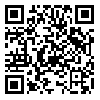Nerve growth factor (NGF) is a neurotrophic factor that is functional in the survival, maintenance and differentiation of nervous system cells. This protein has three subunits, of which the beta subunit has the main activity. Its structure consists of a cysteine knot motif made up of beta strands linked by disulfide bonds. It can be used as a therapeutic agent in the treatment of many diseases. As NGF extracted from natural sources is unsuitable for therapeutic goals, many studies have attempted to produce recombinant β-NGF. In this study, Trigger Factor (TF) chaperone was expressed simultaneously with β-NGF in E. coli in order to obtain increased yield of soluble recombinant human β-NGF. For this purpose, pET39b (+)::β-NGF and chaperone plasmid pTf16 were transferred to E.coli (DE3 strain). After the induction of each promoter, the total proteins and periplasmic proteins were extracted. To confirm the effects of TF on total protein and soluble β-NGF expression level, Bradford and Dot blot techniques and ImageJ software were used. Then, β-NGF was purified using affinity chromatography column (Ni+2-NTA). Also, the PC12 cells were treated with the protein for one week in order to study the function of purified NGF. Our data indicated that co-expression of TF could increase the soluble and periplasmic production of β-NGF but not total proteins. Also, the treatment of PC12 cell line with purified β-NGF, co-expressed with TF chaperone, showed differentiation of these cells to nerve cells. This indicated that the purified NGF is fully functional. Our data suggest that the co-expression of cytoplasmic chaperone (TF) with recombinant nerve growth factor might be an efficient approach to produce a proper quantity of soluble and active rhNGF.
Received: 2016/08/20 | Revised: 2019/02/11 | Accepted: 2017/01/31 | Published: 2018/12/21 | ePublished: 2018/12/21
| Rights and permissions | |
 | This work is licensed under a Creative Commons Attribution-NonCommercial 4.0 International License. |




